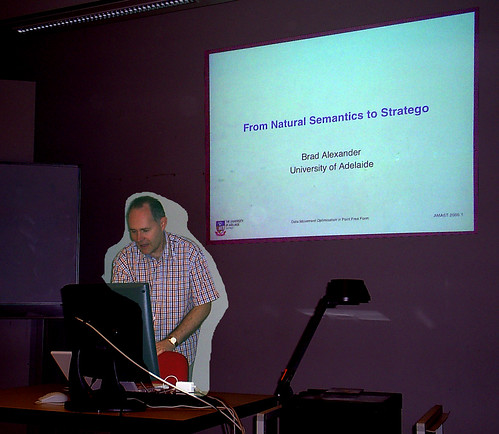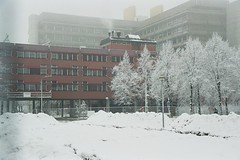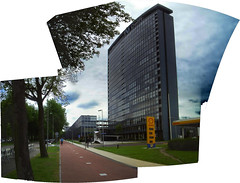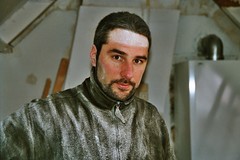
Friday, June 30, 2006
From Natural Semantics to Stratego
Yesterday, Brad Alexander from the University of Adelaide visited the Uithof and gave a talk in the Software Technology Colloquium with the title "From Natural Semantics to Stratego". He explained how he was in the process of converting an implementation of an optimizer for a second-order functional language in natural semantics (using the Centaur system) to a Stratego program using rewrite rules and strategies. As a result of using Stratego, transformations that took hundreds of lines of code could be reduced to only a few.
The exciting thing about his presentation was that the basic Stratego techniques he used were quite unexiting. That is, using the basic ideas of separate rewrite rules and parametric strategies he could greatly simplify his optimizer. I hope to see more of his work in the future.
Brad was on his way to Estonia to deliver a talk at the AMAST 2006 conference.


Career Evolution (Moving to Delft)
Last week I accepted a position as associate professor at the Software Engineering Group of Delft University of Technology. I will join forces there with Arie van Deursen who recently started at TUD as a full professor.
The ambition is to build a strong research group in the area of software engineering, based on our work in software evolution (Arie) and program transformation.
With NWO funding for a project on extensibility of transformation systems and one on model-driven software evolution my tenure at TUD can start full force.
Of course, I will continue work on Stratego/XT and applications together with Martin Bravenboer, who will join me at TUD. I also hope to convince Eelco Dolstra to make the move to Delft.
We are aiming at setting up a new buildfarm for supporting our own, but hopefully also other research projects.

|
=> |

|
Model-Driven Software Evolution
We just got word from NWO, the dutch national research funding organization, that our
project proposal on Model-Driven Software Evolution has been granted. This means
that we will have funding to hire two PhD students, a postdoc, and an assistant professor.
The project is a collaboration between
Arie van Deursen (principal investigator) and myself and is going to take place at Delft University of Technology, (where I'll be moving; see next blog).
If you have an interest in program transformation and domain-specific languages, and the ambition to contribute to the state-of-the-art in these areas, then
you might consider applying for one of these jobs. Official job adverts will be available later (we really just learned about acceptance), but in the mean time you can contact me if you have questions.
Here is the summary of the research proposal:
The promise of model-driven engineering (MDE) is that the development
and maintenance effort can be reduced by working at the model instead
of the code level. Models define what is variable in a system, and
code generators produce the functionality that is common in the
application domain.
The problem with model-driven engineering is that it can lead to a
lock-in in the abstractions and generator technology adopted at
project initiation. Software systems need to evolve, and systems
built using model-driven approaches are no exception. What complicates
model-driven engineering is that it requires multiple dimensions of
evolution. In regular evolution, the modeling language is used to
make the changes. In meta-model evolution, changes are required to
the modeling notation. In platform evolution, the code generators and
application framework change to reflect new requirements on the target
platform. Finally, in abstraction evolution, new modeling languages
are added to the set of (modeling) languages to reflect increased
understanding of a technical or business domain. While MDE has been
optimized for regular evolution, presently little or no support exists
for metamodel, platform and abstraction evolution. It is this gap
that this project proposes to address.
The first fundamental premise of this proposal is that evolution
should be a continuous process. Software development is a continuous
search for recurring patterns, which can be captured using
domain-specific modeling languages. After developing a number of
systems using a particular meta-model, new patterns may be recognized
that can be captured in a higher-level or richter meta-model. The
second premise is that reengineering of legacy systems to the
model-driven paradigm should be a special case of this continuous
evolution, and should be performed incrementally.
The goal of this project is to develop a systematic approach to
model-driven software evolution. This approach includes methods,
techniques, and underlying tool support. We will develop a prototype
programming environment that assists software engineers with the
introduction, development, and maintenance of models and
domain-specific languages.
Subscribe to:
Comments (Atom)
